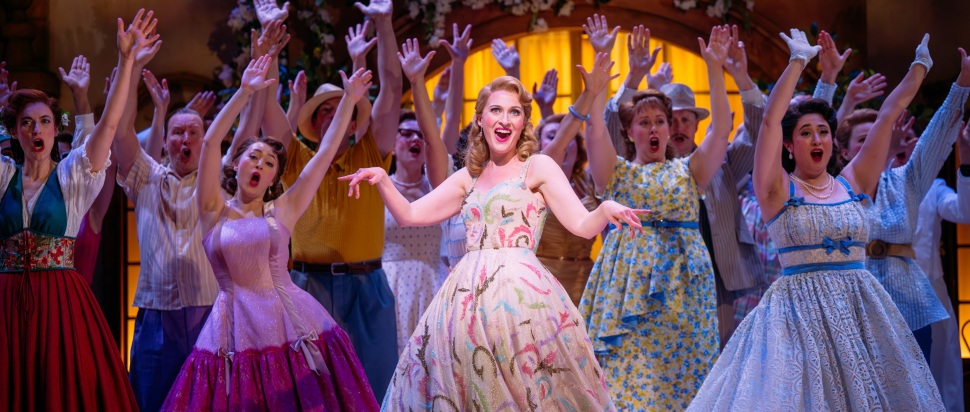All Guns Blazing: Scottish Opera's The Merry Widow
We speak to John Savournin, director of Scottish Opera's new productions of The Merry Widow and Trial by Jury, on the updating of classic operetta for modern audiences and the experience of translating a piece through time
You’ve updated The Merry Widow from 1900s Paris to 1950s New York – why?
It mirrors the original really well. In the original you have a displaced people, the Pontevedrins, who are in Paris and learning how to operate in this other environment, this grand embassy. And in our context there is a displaced people, the Italian immigrants, who are finding a way of surviving culturally in New York. Apart from the elements which fit really well, such as recasting Baron Zeta as Don Zeta, the ‘godfather’, and the hierarchies which come out of mafia organisation – conciliaries, capos, wives – it also adds a kind of a gutsiness and extroversion which lifts the energy and really suits the show.
As you’re rehearsing it, you’re like, "Oh wait, that also works on all these levels"?
Exactly that! Within the story there’s this friction – characters having affairs or butting heads – and it’s amplified in a world where any mafioso who has an affair with someone else’s wife would be in serious trouble in the mafia community. Plus the people who are angry about it aren’t angry in a polite fashion – it’s all guns blazing if you excuse the pun!
I’m also interested that you translated the libretto from German to English. Was it easy to get your important themes across?
In fact, it’s unusual for Merry Widow not to be translated into English. But David Eaton and I, who have done the translation, have been careful to look after the story, particularly Hanna and Danilo’s arc. One of the main challenges was leaning into the New York American dialect. Another challenge has been the story elements – for instance, Act 1 is a dance, a formal ballroom.
Formal ballroom seems very 1900s. Now it’s the 1950s Merry Widow, how does the dance look?
It’s Don Zeta’s new-money penthouse, and he’s throwing himself a birthday party! He invites Hanna Glawari, because her dead husband was a Sicilian mafia boss, and Don Zeta sees the opportunity for one of his own to marry Hanna and into one of Europe’s most powerful mafia families. And the dancing comes into that because dancing is one way that Zeta can pair Hanna with his conciliary Danilo. Everyone there is a close-knit community, at the party with champagne in hand, LPs on record players – we’re one step away from people swinging off the chandelier!
The Merry Widow – why now?
Fundamentally it’s a story about people finding their way in the world in quite a human way – so it’s totally accessible, we can recognise ourselves in it; and the music amplifies that. We hope the audience will be roaring with laughter one moment, then crying at the beauty of it the next. That’s what you’re looking for: a fully-rounded evening at the theatre that has it all.
I love how you’re passionate about how it’s funny. How important is comedy?
I think comedy always has to be earned. It’s not a case of bringing on a horse and a hoop-skirt and hoping it works. It’s integrating it into the story. What’s nice about our mafia world is we’re able to reference. Once you put the mafia world through a comic lens, the audience know what they want to see next – a car bomb, a horse head, a TNT barrel! And while the comedy is hugely important, it is more than a comedy. There’s pathos and that’s key to its success; you need both to make it work.
You’re also doing this as a trio of comic operas, with Trial by Jury and A Matter of Misconduct! What would be the audience experience of seeing all three?
So both Merry Widow and Trial by Jury are operettas from the same period – Trial by Jury is 150 years old, almost to the day.
Wow, an anniversary!
Very much so. Merry Widow is a bit later but operetta was a big part of that era. There is a similar style to that comedic element between Trial and Widow there. Then A Matter of Misconduct! is in a way inspired by Trial, but new and written for now, looking at that relationship between the law and politics. There’s a step between each of our trio of operas which is really nice. If you like one, you will like the next – and then you get treated to this brand new piece, which makes it very fun for the audience!
You know how professional chefs come home and don’t want to cook dinner?
Like a lot of opera singers, I might decide to switch off if opera comes on the radio, to cleanse my ear, but – if Bon Jovi came on, I would be there!
The Merry Widow is at Theatre Royal, Glasgow, 30 April-17 May, then touring
Trial by Jury and A Matter of Misconduct! is at Theatre Royal, Glasgow, 14 & 16 May and Festival Theatre, Edinburgh, 30 May & 6 Jun
